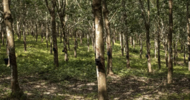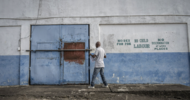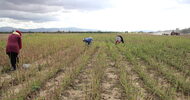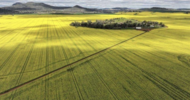Change.org | May 07, 2010
by Te-Ping Chen
Actually, napping might be a generous assessment. Plenty of observers are more inclined to think that the World Bank is deliberately soft-pedaling information about what's going on. And possibly making the situation worse.
We've written about land grabs here before — the phenomenon of countries like China, the U.K. and Saudi Arabia buying up huge land parcels across developing regions in an attempt to shore up resources against growing populations and water and food shortages. Not surprisingly, the trend (with its shades of colonialism) has sparked fury around the world, including in Madagascar, where an attempt by the South Korean conglomerate Daewoo to buy 3 million acres collapsed after rioters literally topped the government in protest.
But pinning down just how much is getting sold off turns out to be a tricky enterprise. Certainly, the World Bank isn't making it any easier. A study on the issue was slated for release last December, and then pushed back to this March. Reporters were told the report would be released on April 26. But nothing's materialized yet.
Meanwhile, the scramble for land continues. China has leased 7 million acres in the Democratic Republic of Congo, with plans to build the world's largest oil palm plantation. The CEO of New York-based investment fund Larch Capital has leased around 1 million acres in Sudan from the warlord Paulino Matip. Media accounts of land grabs are being collected at farmlandgrab.org, but deals are opaque, and information spotty.
It doesn't seem like the World Bank has had much luck piercing the veil, either. Though the World Bank intended to examine 30 countries for its study, it reports that governments and corporations haven't exactly been forthcoming with the information.
The World Bank hasn't exactly played a passive role, though. European investors say they'll be relying on the World Bank's Multilateral Investment Guarantee Agency to insure themselves against political risk in forthcoming deals. "You'll have the World Bank on your side," Gary Vaughan-Smith told Pensions & Investments last month. Vaughan-Smith works for London-based SilverStreet Capital LLP, which recently inaugurated a $300-million fund to invest in Africa's farmland. "They're going to have enormous clout if there are any difficulties," he says.
And even though the World Bank has announced some tepid steps along with the United Nations to protect against land grabs, don't expect much out of the process. Regulations on land acquisitions aren't expected until at least late this year. What's more, even when they are introduced, they'll be non-binding: as UPI reports, the UN doesn't want to restrict direct foreign investment in agriculture. In other words, what they're offering will basically amount to a friendly list of helpful suggestions.
Te-Ping Chen is a Change.org Editor. In recent years, her writing has appeared in the Nation Magazine, the South China Morning Post magazine, Le Soir, and Slate.com.













